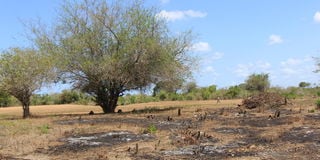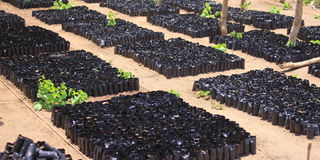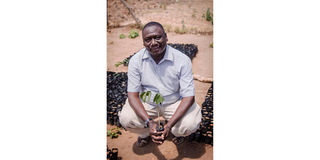Premium
Community tree planting to restore Magarini, Malindi back to life

The effects of cutting down trees for firewood in Magarini has left form barren lands, lowering the value of land which could have unsustainable socio-economic effects in the future.
What you need to know:
- Magarini is the main supplier of charcoal and wood fuel in the city of Mombasa and in Malindi town.
- The harsh weather has seen a decline in land value as land-buying companies retail an acre for as little as Sh35,000 an acre.
- To restore Magarini back to life, MEDA-F has so far planted 120,000 tree seedlings in the last one year.
“The last planting season, there was no harvest in the entire village, a big blow to the locals who depend on rainfall for their livelihood. The ensuing drought has led to famine. It is a tough choice for families. If there is no alternative, there will be a big socio-economic problem in the future as without food and no source of income, even a good number of the children will not be attending school. In the meantime, we are encouraging tree planting. Tree planting will solve a multitude of problems in this community.”
Those are the words of Mr Ferdinard Kahindi, a former Councilor and a resident of Ngarashe village in Magarini, Kilifi County. His home is beaming with green shades of trees. This is a sharp contrast to most of his neighbours whose barren lands don anthills.
“I had an interest in tree planting long before I even built here. I have grandchildren and I wanted to create shade where they can play, Mr Kahindi, aged 78, said as he showed us around.
So, when the local association approached him with a need for a place to put up a tree nursery, Mr Kahindi did not hesitate to donate a quarter-acre parcel next to his home to tree planting activities.
“I thought to myself ‘Why not?’” He recollected. Back in the day, recalled the former teacher, Ngarashe village was one dense forest that experienced frequent heavy rainfall. But both trees and rainfall have been diminishing over the years. “I took it upon myself to advise my community on the importance of tree planting as they attract rainfall, give shade, purify the air that we breathe, calm the environment and help in setting household boundaries. As a leader, I had to set a good example by planting trees in my compound,” he said.
However, charcoal burning has been a big challenge to environmental conservation, not only in Ngarashe village, but in the wider Magarini Constituency, he added. Magarini is the main supplier of charcoal and wood fuel in the city of Mombasa and in Malindi town.

This boda boda rider was captured along the Malindi-Sala Gate Road while transporting charcoal from Magarini to Malindi.
Similar sentiments are shared by his son, Charles Kahindi: “While I was growing up, we had two seasons of long and short rains and whenever we planted our food crop, the harvest was in plenty. However, in the last ten years, Ngarashe has been recording minimal rainfall.”
Charles and 14 other community members have been encouraging tree planting in their community, under the Green Umbrella Movement, a local community-based organisation involved in tree planting for environmental restoration in the Bore area. Green Umbrella is partnering with Malindi Education and Development Foundation (MEDA-F) in a project that is supported by the I&M Foundation and Kenya Community Development Foundation (KCDF) under the environment and resource management programme. The group has so far planted 120,000 tree seedlings in the last one year.
The group plants casuarina, tamarind, moringa, cashew nuts, neem and mango tree seedlings. The mango tree seedlings, Charles explained, act as an incentive to the local farmers as they plant fruit trees alongside indigenous trees. The indigenous species are climate-averse and cope well with the local harsh and dry environment since they are drought resistant.
Of the 15 members, only four are women. However, the group involves women from the locality in all of its activities. “Whenever we get support for the project, women provide the labour at Sh350 per day which allows them to earn a wage,” Charles said. The men also get to create awareness on tree planting, dig the holes for tree planting and ferry the seedlings to schools.
“We sensitise children in schools on the importance of planting trees and we see to it that the principals commit themselves to tree planting activities,” he said.
In the past one year, there have been tree planting activities at the Arabuko Sokoke Forest and in community places, such as chiefs’ offices and schools. Through the office of the Director of Education in Magarini, MEDA-F has been able to engage school heads in tree planting exercises within their schools.

MEDA-F tree nursery in Ngarashe village in Magarini. The tree nursery has distributed tree seedlings to schools and the community in the past one year.
Seven schools in Magarini have been involved in tree planting in their environment. There are water tanks at the schools to enable them to water the seedlings for the first three months. Most of the schools have planted seedlings of the tall wide trees used as fences to mark their boundaries. Agriculture teachers in charge of 4K clubs have embraced tree planting in schools.
Tree seedlings
After planting, the learners take the remaining tree seedlings home to their family members to plant, and they take care of the trees. The project is nurturing these future leaders to fully change their mindset on the importance of trees, and why logging for charcoal burning and wood fuel is dangerous for socio-economic development.
“In secondary schools, the students set up their agriculture examination projects within the nursery bed projects. They make use of the seeds for their exam projects and the trees end up being planted within the school. We had already purchased them, so they took five kilogrammes and took care of the nurseries. It was a win-win situation to all of us,” said Attas Sharif, the Executive Director at MEDA-F.
Community members are responsible for planting and nurturing young tree seedlings to maturity. “We monitor the progress to ensure that there is growth,” said Charles. Residents who take tree seedlings for planting are entered into a database that captures their national identification card number, village, tree type and number of trees taken for follow up. The group members also have a motorbike to facilitate community monitoring.

Executive Director at MEDA-F Attas Sharif.
With increased awareness on tree planting, there has been high demand for seedlings from community members. As the project enters in its second year thanks to the generous support of I&M Foundation, a lot has been achieved. A record 120,000 trees have been planted in three months, and women are getting more involved in tree planting unlike before.
Buying tree seedlings would have been such an expensive affair for MEDA-F, so having tree nursery seedbeds was the catch. “We bought tree seedlings from Kenya Forestry Research Institute (KENFRI) and engaged Green Umbrella for the seedbeds. We have been with them on the ground in tree planting activities. We give the technical support on set up of tree nurseries and the planting know-how,” said Jilo Mijungu, the Project Manager at MEDA-F.
There have been other grassroot organisations working with MEDA-F, but Green Umbrella was their first partner because of the experience that they have on the ground. “Green Umbrella were having challenges accessing seeds to start nurseries, so we revamped everything and started two big nurseries at Bore and Ngarashe. Other two nurseries were set up in Maraba and Gongoni Secondary Schools.
The results were impressive. The Bore tree nursery gave 120,000 seedlings, while the Ngarashe nursery bore 70,000 seedlings. But it is the distribution model that was the game changer for MEDA-F. The organisation mobilised for grassroots support through the county administrators, created awareness and lobbied for partnerships.
Motivation
“We brought in Sub-County administrators and ward administrators, agricultural extension officers who assisted in the establishment of the nurseries. We considered fruit trees like mangoes, coconut, and passion fruits as incentives that were a motivation to the farmers,” Mr Mijungu explained. MEDA-F ensured that there were between 500 and 1000 fruit tree seedlings in each tree planting exercise, to motivate local farmers in each tree planting.
The nurseries function as a distributing point, and all the information about them and the type and number of trees is recorded in all these nurseries. The field extension officers take names of farmers - from household level - and follow up on the fruit trees to see their growth. Kilifi County government agriculture department assisted in conducting the grafting.
“There has been a lot of innovation in how we relate to the government officials and the extension officers. We brought them in to own the entire process,” said Mr Attas. The field extension officers ensure that the community takes responsibility.
The erratic rains do not guarantee that trees have adequate water. Thanks to the I&M Foundation and KCDF partnership, MEDA-F is exploring the drilling of boreholes and connecting water to schools. The project has struggled to meet the high demand for fruit tree seedlings from farmers. Most of the seedlings like coconut and mango are expensive to maintain and the seeds come at a higher cost. In addition, to fully stop deforestation in the community the project has to find an alternative source of income.
A viable solution in future is the establishment of kitchens for women, and irrigation farming to grow maize and other food crops. There is a ready market in Malindi as most of the food crops are ferried from Nairobi, and other places. Irrigation agriculture can be a viable venture for the locals because they own large tracts of land.
“Even for the nurseries we had to identify places with water. In the next implementation phase, we will have to factor in water access for sustainable solutions. For the community to adopt and to nurture trees, there must be an aspect of economic sustainability. We want to grow the community, especially farmers, into agri-preneurs,” said Mr Attas.

Charles Kahindi, who has been running the tree nursery in Ngarashe together with 14 other community members.
Across Magarini and in the wider Malindi, there are many land-buying companies, retailing land for as little as Sh35,000 an acre, as its value is low because the locals do not know what to make of the vast tracts of land they have. There are no water sources, and the area receives very minimal rainfall, if any. This is a ticking time bomb that could potentially lead to socio-economic issues in the future when the locals will have nowhere to call home.
MEDA-F also partners with Mothers of the Forest, a CBO in Magarini that is known by the locals and understands their area's conservation needs. “The CBO is embraced with a lot of goodwill by the Giriama community – and we use them to pass the information and we build their capacity as they work with us,” said Mr Attas.
Mothers of the Forest and Green Umbrella have grassroots networks and MEDA-F leveraged on that network. Farmer organizations and associations such as Sauti ya Wanawake are among the other beneficiaries in Ngarashe.





